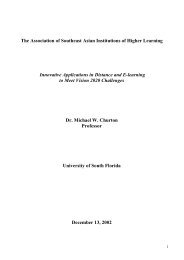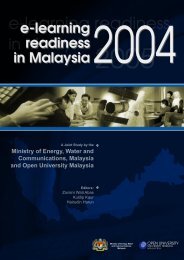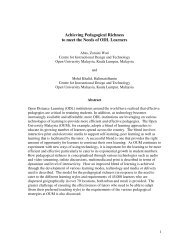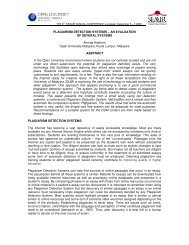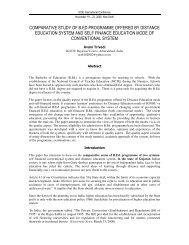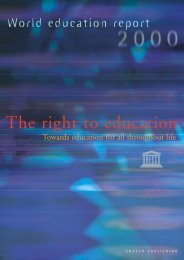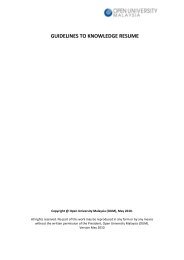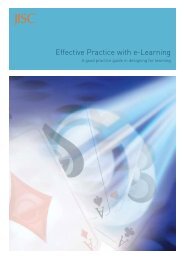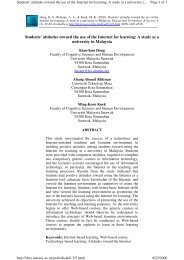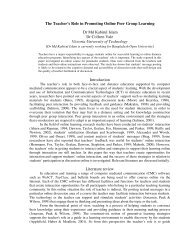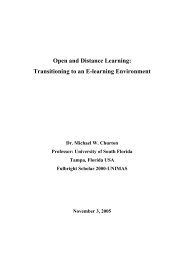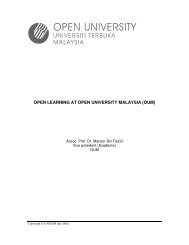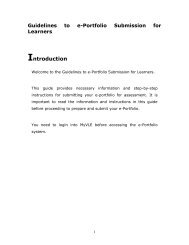teacher, erosion of traditional academic values, loss of a sense of community <strong>and</strong> sharedtradition, technological development at the expense of pedagogical st<strong>and</strong>ards, a tendencytowards cultural homogenisation, <strong>and</strong> an emphasis on quantity over quality. The chapterby Insung Jung provides a valuable contribution to this debate by giving an overview ofthe quality assessment systems used by the mega-universities.INTERNATIONAL SIGNPOSTSIn their efforts to grapple with the above-mentioned challenges, policy-makers canbe encouraged by the fact that there has already been — <strong>and</strong> continues to be — muchcollective brainstorming as well as practical collaboration going on nationally, regionally<strong>and</strong> internationally. Here UNESCO has, of course, played <strong>and</strong> continues to play a centralrole through its meetings, reports, publications <strong>and</strong> collaborative projects. One suchproject, described in the chapter by Zeynep Varoglu, brought together an internationalteam of experts in the fields of informatics <strong>and</strong> <strong>higher</strong> <strong>education</strong> with the aim ofsupporting informed decision making for quality provision of open <strong>and</strong> <strong>distance</strong> <strong>learning</strong>.As Ms Varoglu shows, the experiences gained from such a project can provide valuablelessons for future initiatives in the same general area.An equally important contribution by UNESCO <strong>and</strong> other organisations has beenthrough various seminal conferences that have helped to pave the way forward <strong>and</strong>establish signposts for the future. These include the series of international conferenceson adult <strong>education</strong>, the most recent of which took place in Hamburg in 1997. TheHamburg Declaration <strong>and</strong> the Agenda for the Future, which emerged from it, remain keydocuments. The UNESCO World Conference on Higher Education, held in 1998, wasalso a seminal event <strong>and</strong> resulted in a World Declaration on Higher Education for the 21 stCentury. This called, among other things, for <strong>higher</strong> <strong>education</strong> institutions to be open toadult <strong>and</strong> <strong>lifelong</strong> learners <strong>and</strong> to make full use of ICTs. Going beyond the functionalistmodel, it also said that students should be educated to become critical thinkers <strong>and</strong>responsible citizens (UNESCO, 1998). A further very important UNESCO initiativewas the launching in 2002 of the Global Forum on International Quality Assurance,Accreditation <strong>and</strong> the Recognition of Qualifications in Higher Education, an internationalplatform for co-operation <strong>and</strong> bridge-building between governments, inter-governmentalorganisations, <strong>higher</strong> <strong>education</strong> bodies <strong>and</strong> other stakeholders. The main framework forUNESCO’s actions in <strong>higher</strong> <strong>education</strong> are its six Conventions on the Recognition ofQualifications, five of which are regional <strong>and</strong> one inter-regional. These conventions arekey st<strong>and</strong>ard-setting instruments in <strong>higher</strong> <strong>education</strong>, ratified by some 120 member statesof UNESCO.Apart from the pioneering work of UNESCO, there have been a number of otherimportant conference declarations <strong>and</strong> international initiatives. The Cologne Charter of1999, adopted by the G8 group of advanced industrial nations, recognised the importanceof <strong>lifelong</strong> <strong>learning</strong> as a “passport to mobility” <strong>and</strong> laid down various strategies for itsfuture development, including. “modern <strong>and</strong> effective ICT networks to support traditionalmethods of teaching <strong>and</strong> <strong>learning</strong> <strong>and</strong> increase the quantity <strong>and</strong> range of <strong>education</strong> <strong>and</strong>training, for example through <strong>distance</strong> <strong>learning</strong>.” (G8). The Bologna Declaration of thesame year, signed by 29 European ministers of <strong>education</strong>, set in motion the “,” which aims to create greater consistency, comparability <strong>and</strong> interchangeabilityamong European <strong>higher</strong> <strong>education</strong> systems as well as promoting co-operation in qualityassurance.Providing essential continuity in international co-operation are various networks,7
associations <strong>and</strong> groups of countries working together on joint <strong>education</strong>al projects <strong>and</strong>sharing resources, knowledge <strong>and</strong> experience. A leading example is UNESCO’s partnerin the creation of this book, the Commonwealth of Learning, launched in 1989 <strong>and</strong> basedin Vancouver, whose mission is to assist “Commonwealth member governments to takefull advantage of open, <strong>distance</strong> <strong>and</strong> technology-mediated <strong>learning</strong> strategies to provideincreased <strong>and</strong> equitable access to <strong>education</strong> <strong>and</strong> training for all their citizens.” (COL).Other such groupings <strong>and</strong> networks exist at regional level. For instance, the Council ofEurope <strong>and</strong> UNESCO have established the European Network of National InformationCentres on academic recognition <strong>and</strong> mobility (the ENIC network). These centres(ENICs) work in complementarity with the National Academic Recognition Centres(NARICs), established by the European Union.An important role here is also played by bilateral organisations, such as the Netherl<strong>and</strong>sOrganization for International Cooperation in Higher Education (NUFFIC), whose aimis to help strengthen <strong>higher</strong> <strong>education</strong> institutions in its partner countries. It also furthersacademic interchange <strong>and</strong> student mobility between those countries <strong>and</strong> the Netherl<strong>and</strong>s,<strong>and</strong> promotes harmonisation of qualification <strong>and</strong> recognition systems. Chapter 10 of thisvolume is a contribution by Astrid Scholten <strong>and</strong> Jindra Divis of NUFFIC, discussingtwo aspects of the Dutch experience in promoting cross-border recognition <strong>and</strong> mobility.The chapter first addresses the issue of outgoing students <strong>and</strong> the measures taken by theNetherl<strong>and</strong>s to improve quality assurance <strong>and</strong> recognition of programmes outside thecountry. Secondly, the authors describe procedures for recognising the competence ofincoming students. The Dutch experience is presented as an example of good practicefrom which others can draw their own lessons.While all of the various international conventions, declarations, processes, networks etc.present a somewhat complex picture, they reduce the need for <strong>education</strong>al planners <strong>and</strong>decision-makers to “reinvent the wheel” in their particular initiatives. There is, however,a further important prerequisite for effective programmes, namely research. In theplanning of <strong>distance</strong> <strong>higher</strong> <strong>education</strong> one needs reliable <strong>and</strong> up-to-date information <strong>and</strong>analysis in a variety of areas, chiefly the following five: (1) learners <strong>and</strong> their needs; (2)teachers <strong>and</strong> their needs; (3) the needs of employers <strong>and</strong> the market; (4) didactic methods;(5) technological developments (such as methods of online delivery of <strong>learning</strong> material).Tony Bates, in Chapter 11, addresses this topic. He describes how, with the expansionof <strong>lifelong</strong> <strong>learning</strong> <strong>and</strong> <strong>distance</strong> <strong>higher</strong> <strong>education</strong>, the body of research on these areashas grown, yielding very important findings for policy-makers. This body continues toexp<strong>and</strong>, as it must if the field is to flourish <strong>and</strong> grow <strong>and</strong> <strong>higher</strong> <strong>education</strong> is to play itsfull part in creating a true <strong>learning</strong> world.8
- Page 1 and 2: PERSPECTIVES ONDISTANCE EDUCATIONLi
- Page 3 and 4: The Commonwealth of Learning (COL)
- Page 5 and 6: ACKNOWLEDGEMENTSIn addition to the
- Page 7 and 8: These are some of the issues that a
- Page 9 and 10: What are the trends and issues in l
- Page 11 and 12: of policy implications relating to
- Page 13 and 14: evince important differences that c
- Page 15: inequitable regulations governing t
- Page 19 and 20: THE CONTRIBUTORChristopher McIntosh
- Page 21 and 22: INTRODUCTIONIn his 1996 report to U
- Page 23 and 24: Lastly, our analysis of the situati
- Page 25 and 26: diploma or similar certificates of
- Page 27 and 28: force of the undertaking. Here agai
- Page 29 and 30: RELEVANT INTERNET SITESUNESCO Task
- Page 31 and 32: Notes1. This phrasing has been used
- Page 33 and 34: goals (Daniel, 1996). Lifelong lear
- Page 35 and 36: eported that group activity had red
- Page 37 and 38: NEW AREAS FOR DISTANCE EDUCATION:WO
- Page 39 and 40: targets systematically for the use
- Page 41 and 42: Rausch, A.S. (2003). A case study o
- Page 43 and 44: correspondence teaching systems tha
- Page 45 and 46: significant differences between syn
- Page 47 and 48: In distance flexible- and blended-e
- Page 49 and 50: STATE-FUNDED DUAL-MODE SYSTEMS ATUN
- Page 51 and 52: Table 4.2: Fundable elements in dis
- Page 53 and 54: sciences in 21 countries of the reg
- Page 55 and 56: How a system is funded depends in p
- Page 57 and 58: Litto, Fredric M. (2004). Digital l
- Page 59 and 60: CHAPTER 5LIFELONG LEARNING IN THE A
- Page 61 and 62: education, which was initiated by C
- Page 63 and 64: So the virtual classroom acted as a
- Page 65 and 66: In June 2002, when the course came
- Page 67 and 68:
RELEVANT INTERNET SITESFORCIIR proj
- Page 69 and 70:
11. The approximate rate for 1€ w
- Page 71 and 72:
The term modern distance education
- Page 73 and 74:
the National Networked Consortium f
- Page 75 and 76:
important resource for undeveloped
- Page 77 and 78:
standards have been proposed for th
- Page 79 and 80:
The development of e-learning withi
- Page 81 and 82:
RELEVANT INTERNET SITESCCRTVU Onlin
- Page 83 and 84:
MoE (2004b) The Notice on Running N
- Page 85 and 86:
CHAPTER 7QUALITY ASSURANCE SURVEYOF
- Page 87 and 88:
(Paris, France, 28-29 June 2004) in
- Page 89 and 90:
Examples of elaborated QA policies:
- Page 91 and 92:
plans and produces its conventional
- Page 93 and 94:
SHTVU (China)• Teaching• Teachi
- Page 95 and 96:
offers its programmes to Turkish ci
- Page 97 and 98:
mega universities apply a set of st
- Page 99 and 100:
RELEVANT INTERNET SITESThe Commonwe
- Page 101 and 102:
2. QA initiatives or publications b
- Page 103 and 104:
assurance of ODL. This DST will be
- Page 105 and 106:
Educational Planning has been respo
- Page 107 and 108:
A system of weighting of the key qu
- Page 109 and 110:
RELEVANT INTERNET SITESHigher Educa
- Page 111 and 112:
CHAPTER 9THE FINNISH VIRTUAL UNIVER
- Page 113 and 114:
foreign providers. In Finland, the
- Page 115 and 116:
to make the best use of new educati
- Page 117 and 118:
The foremost task for the Service U
- Page 119 and 120:
part of quality management. The aim
- Page 121 and 122:
online courses; an educational tech
- Page 123 and 124:
polytechnics, research institutions
- Page 125 and 126:
CHAPTER 10PROMOTING CROSS-BORDERREC
- Page 127 and 128:
The Bologna Declaration was followe
- Page 129 and 130:
indicators currently being used for
- Page 131 and 132:
the qualification resulting from th
- Page 133 and 134:
Table 9.1: Outline of the portfolio
- Page 135 and 136:
• Make sure that incoming student
- Page 137 and 138:
CHAPTER 11CHARTING THE EVOLUTIONOF
- Page 139 and 140:
Another common characteristic was t
- Page 141 and 142:
the current capacity of the educati
- Page 143 and 144:
conditions for success. Conditions
- Page 145 and 146:
Cultural and ethical issues in inte
- Page 147 and 148:
the cost and maintenance of learnin
- Page 149 and 150:
Research can be a useful tool for c
- Page 151 and 152:
REFERENCESBates, A. (1995). Technol
- Page 153 and 154:
Twigg, C. (2001). Quality Assurance
- Page 155 and 156:
y, for example, entering into partn
- Page 157 and 158:
and even greater steps, and the dec



